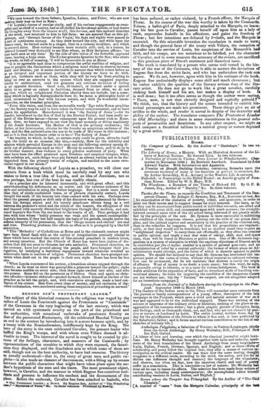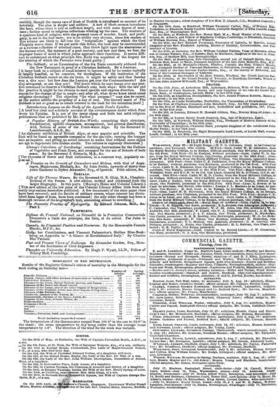PUBLICATIONS RECEIVED.
BOOKS.
The Conquest of Canada. By the Author of "Ilochelaga." In two vo- lumes.
The Liberty of Rome; .a History. With an Historical Account of the Li- berty of Ancient Nations. By Samuel Eliot. In two volumes. A Narrative of Events in Vienna, from Latour to Windischgriitz: (Sep- tember to November 1848.) By Berthold Auerbach. Trenelated bysiTolus Edward Taylor. With Introduction and Append's. A Treoatise on ZientNt Building Societies; containing Remarks upon the erroneous tendency of many of the Societies at present in existence, &c. . By Arthur Scratchley, M.A., Actuary to the Western Life Aseuranaa. Kaloolah ; or Tourneyings to the Djebel Kurnri: an Autobiography of Jona- than Romer. Edited by. W. S. Mayo, M.D. The Viraodniati; a Romance of the Times of Richard M. By G. P. S. James, Esq., Author of "Darnley," &c. In three volumes.
Tactics for the Times, as regards The Condition and Treatment of the Dan- gerous Classes. By Jelinger C. Symons, Esq., BA., Barrister-at-law, &as [An examination of the statistics of poverty, crime, and Ignorance, in order to point out their causes and to,suggest mums foe their removaL The facts, so far as they can be ascertained from public record or individual research, are sifted and exhibited with great skill, and conuminted upon with much examen; the straight- forward common-sense view of the old school being informed if not greatly mall- fled by the principles of the new. Mr. Symons is more successful in exhibiting the condition of the dangerous classes, pointing out the evils of our prison disci- pline, and the judicial caprice and uncertainty its the practice of the criminattaie, than in the remedies he suggests. It is not that his propositions are impracti- cable, or that they would not be beneficial; but as matters stand they require Int "enlightened despotism " to-earry them out effectually, as they often run counter to public opinion, and imply a vast deal mere of energy, skill; zeal, and spare time, than will be found in Ministers or public men. One of Mr. Symone's sug- gaetiona is &system of education in which the captious objections of Dissent are to be overridden per /as et nefas; another is a.system of general poor-rate, and an administration of relief by a central authority: the former of which plans no Ad- ministration would attempt, and the latter of which is directly opposed to public opinion. We should feel inclined to say that Mr. Symms has overlooked the filly portant point of the cause of crime, without whose removal no enforced reforma- tion can be permanent, did he not maintain that distress is rarely the origin of offences. Waist of money is no doubt a main cause; but this want, he says, is generally owing to idleness, or to a taste for vicious indulgences. The book lit worth attention forits exposition of facts, and its trenchant mode of handling con- ventional abuses; its hints for improving the condition of the dangerous are not without use; but the "Tactics," we suspect, are not altogether adapted for an immediate campaign.] Leaves from the Journal of a Subaltern during the Campaign in the- Pun- jaub. September 1848L to March 1849. [The readers of the Indian news in the Times will remember some extracts from the journal or family correspondence of a young officer, descriptive of the late campaign in the- Punsaub, which gave a vivid and natural account of war as it was and appeared to be to the individual engaged. There was nothing of the science or largeness of the military critic, or historian, nothing of the glare or ex- aggeration of the romance-writer ; but a plain graphic picture of thoughts, fedi!, and feelings, such as thousands think, see, and feel, who are not elevated by posi- tion or nature, or' hardened by habit. The entire journal, written down day by day foe the gratification of the friends to whom it was sent, is here published by the Subaltern's father; arid, it fornts.another curious contribution to the list. otear sketches of military life.] Anthologies Palyglottai, a Selection. of Versions iaVarlons Languages, obi* from the Greek Anthology. By Henry Wellealey, D.D., Principal of Now Inn Hall, Oxford. [A labour of love and learning, over which the classical journalist might luxu- riate. Dr. Henry Wellesley has brought together with taste-and industry, speci- mens of the best translations of the Greek Anthology from many languages-' Latin, Italian, French, German„ Spanish, and English; and as these effort* of scholarship and poesy follow the original text, they offer a means of curious.in- vestigation to the critical reader. He can brace how the same leading thought reappears in a different mode, according. to the mind, the nation, and (so far as diction can influence thought and manner) the language of the translabok and observe, too often, we fear,, how the nameless charm and soul of poets, suffer in a trauslation. This is inevitable—a law of nature: Dr.-Wellesley hes done, all he can to lessen its effects. The selection has been made from veritarsef various ages, including many contemporaries- the accomplished editor himself contributing versions in Latin, Italian, and English.] Scenes where the Tempter has. Triumphed By the Author of "The eikoI Chaplain." C& number of "cases" from tbs. hiessgate. Calendar, principally of tee' 11116 century, though the recnop woof Rush of Norfolk isintrodneed on account of its notoriety. The plan le !mettle and uniform. 'A tort of 'short sermon introduces the hero, whose story is told at sufficient length, and with some degree of neat- ness ; further moral or religions reflections winding up the case. The mixture of a gpusious kind of veligtoo, with the grossest cases of murder, fraud, and proffi- gacy,iii not in the best taste; nor is its utility very obvious, since few readers of This volume are likely to. fall into the " temptations " against which the Gaol Chaplain warns them. If we pat aside this defect, the book may be recommended as a curium collection of criminal eases, that throw light upon the aberrations of the human mind, the manners or a past century, and now and then, we fear, the improper frame of mind in which juries approach their functions. It seems diffi- cult M understand on what_principle Mrs. Rudd was acquitted of the forgery for the uttering of which the Perreaus were found guilty.] The Sabbath; or an Examivation of the Six Texts commonly adduced from the New Testament in proof of a Christian Sabbath. By a Layman. [A large book on a subject of small interest to laymen; and by no means logically or largely handled, as we conceive, for theologians. If the institution of the chruitian Sabbath rested on the six texts, it might be safely said that Sunday was a dies non: but how does the Layman get over the Commandments? Me Mei-abrogated, or are they not? The doubt which he says hangs over any posi- tive command id observe it Christian Sabbath cuts both ways: with the law and the in-notice it Might be too obvious to need specific and express direction. The reasenfor the-ehange of day is ample; and after all, what do we know about exact religious chronology ? The objection "for what purpose?" may also be raised, as the author actuate the propriety a'a day of rest. The literary merit of The Sabbath is not so great AS to emote interest in the book for the execution itself.] - -Introductory Lessons on the Study of the Apostle Paul's Epistles.
[A brief but clear and scholarly account of. the circumstances under which Paul wrote his Epistles. It is one of the many theap and little but solid religious publications that are published by Mr.. Parker.]
- A Popular History of BritishSea-Weeds; comprising their structure -fructification, sp.ftific characters, arrangement, and general distribution: 1 with .Notices of some of the Fresh-water Algx. By the Reverend D.
Landsborough, A.L.S., &c.
[M elaborate exhibition of British Algm, at once popular and scientific. The book will be found an agreeable companion for the sea-side; turning the lounger into at inquirer, and giving an active interest to walks that without some object are gpt to degenerate intoldeless strolls. The‘voltime is copiously illustrated.] - Glenny's Catechism of Gardeningi containing Instructions for the Culture _. of Vegetables and bruit-Trees and arranged for the use of Schools of both'
:sexes. By the Reverend J. edwards, 144., &c.
[The -elements of .flower and Emit Cultivation, in a common way, popularly ex- piesled.]- , A Treatise on the Growth of Cucumbers and Melons, with that of Aspa ragu-s, Mushroorns,Rbilbath, 860- BY Jahn Smith, upwards of thittY^four years Gardener to Dykes Alexander, Esq., of Ipswich. Fifth edition, Sm.
SERIALS.
Life qf ,5ir Thomas Munro. By the Reverend G. R. Gleig, M.A., Chaplain-
" General of the Forces. A new edition, revised and condenaell,fruni. the larger Biography. In two parts. (Murray's Horne rind Colonial Library.) [This new edition at the low price of the Colonial Library differs little from the costly impressions heretofore published. A few documents of the state paper class have been removed; and the details of military events, whose interest has dimin- ished from Jape of time, ham been condensed; the only other change has been a thorough revision of the biogriiplierb text, amounting almost to rewriting.]
The Dopzestk Practice Hytlropathy. BjIdiward Johnson, /ID., -8co.--
- . PAMPHLETS.
Defeme du Travail National, on Necessit4 de Is Protection Commerciale Demontree a l'aide des principes, des faits, et du calcul. Par Jules le . Butler.
Canada, its Financial Position and Resouroes. By the Honourable Francis Hincks M.P.P., &c.
&nay; her Constitutions, and Viscount Arlmerston's Sicilian Blue-Book: . - -being en Appendix to " A Glance at Revolutionized Italy." By Charles Mac Farlane.
Past and Present Views of Railways. By Alexander Gordon, Esq., Mem- ber of the Institution of CivilEngtneers. • - 7'houyets on University Education. By Hugh P. Wyatt, LL.D., Fellow of Trinity Halt, Cambridge.



























 Previous page
Previous page